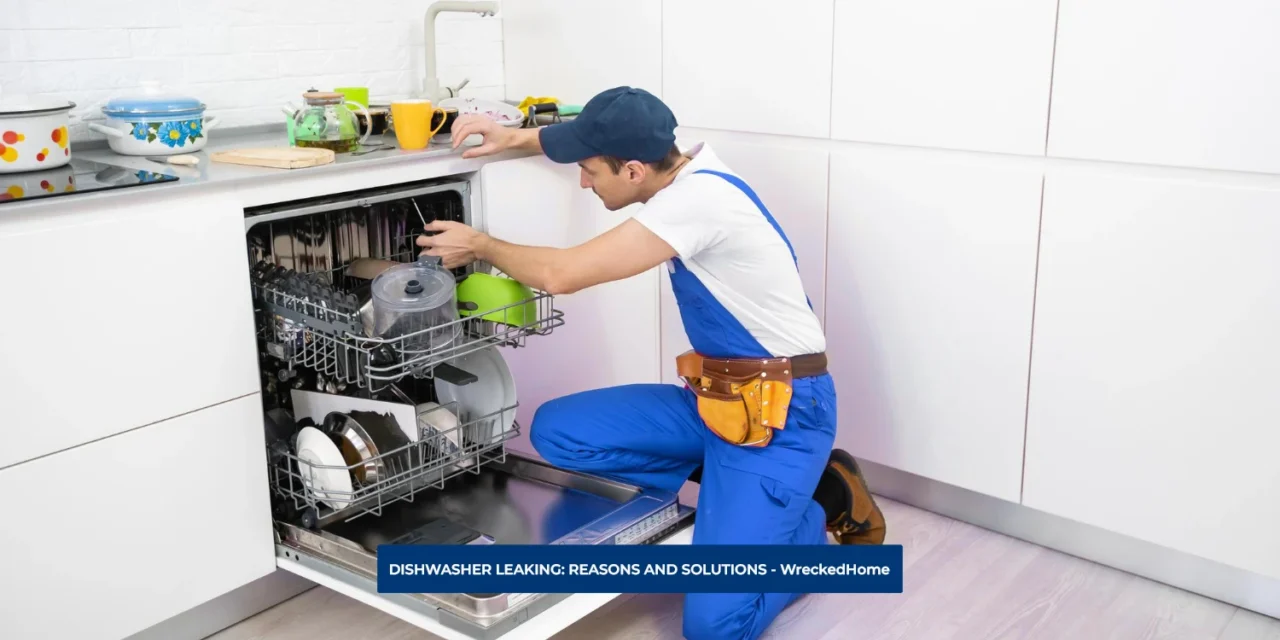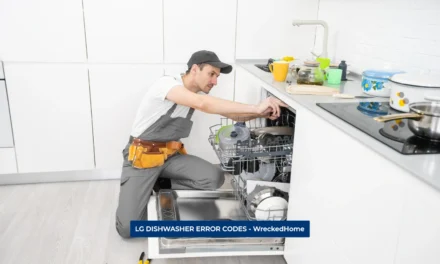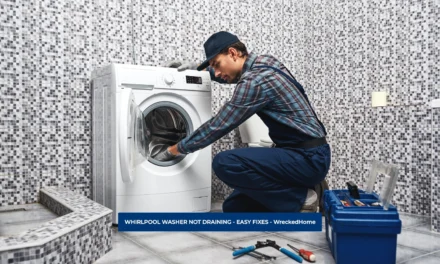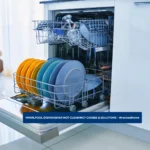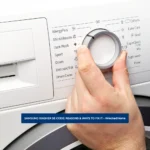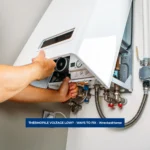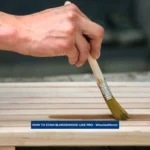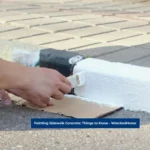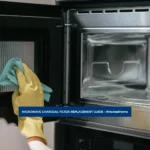Homeowners prefer to have electronic gadgets in this fast-paced lifestyle. Dishwashers have become indispensable appliances that offer convenient solutions to save time on manual dish washing. Even though dishwashers are great, they still can have problems. It is not smart to think that issues with your dishwasher wont happen at some point.
In electric dishwashers, there are chances of your dishwasher leaking. If it remains untreated then it is poses a threat to both the appliance and the surrounding kitchen area. Taking care of dishwasher leaks should be extremely important to you. Doing this ensures that your dishwasher works for years to come. It also ensures that you don’t experience mold or water damage. With that being said, it is necessary to know the root cause of damage that leads to leakage.
In this comprehensive guide, you will know the reasons behind dishwasher leaks, improper drainage, and be provided practical solutions to empower users so they can enjoy leak free dish washing.
Common Causes of Dishwasher Leaking
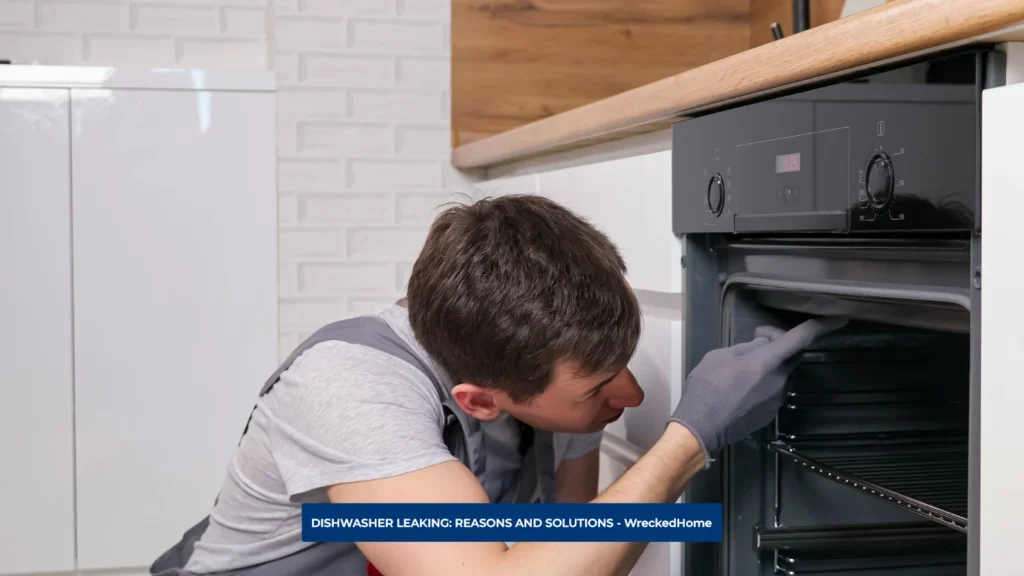
Dishwasher leaks can be attributed to various factors that require proper treating. You need to pay attention if you find any issues in your dishwasher. Let’s have closer look on some of the common causes of dishwasher leaking:
- Faulty Door Seals: Door seals are important parts of the dishwasher that play a crucial role in preventing water from seeping out during the washing cycle. Over time, the seal becomes old and has chances of wearing out. Therefore, it’s important to know the symptoms of cracked seals. It is essential to maintain an effective barrier against water leakage with seal replacement.
- Damaged Tub or Tub Gasket: The dishwasher tub, along with the tub gasket, is surrounding the water drainage pipe. Any damage to the tub or gasket can lead to lethal amounts of leakage. Regular inspection of the tub and gasket is necessary to find any signs of wear. In this situation, the replacement is crucial to prevent water from escaping.
- Worn Out Hoses and Connections: Hoses and connections are the key parts of dishwashers that facilitate the flow of water in and out of the dishwasher. Wear and tear on these components is a serious issue that can also be the source of your dishwasher leaking. Inspecting hoses for visible damage is necessary so you can take immediate action. To check any cracks or bulges, follow the experts guidelines.
- Malfunctioning Water Inlet Valve: The water inlet valve is a structure that regulates the flow of water into the dishwasher. Any malfunctioning of the valve can result in overfilling and the final result is leakage. One of the common signs of fault in the valve includes water accumulation in the dishwasher between cycles. Diagnosing and replacing the water inlet valve is important to avoid further dishwasher leaking.
- Overloaded Dishwasher: Overloading the dishwasher is dangerous for your health. Therefore, its important to follow the loading guidelines provided by the manufacturer and avoid overcrowding the dishwasher. Proper loading practices contribute to the prevention of leaks and give ease to the user during operation.
- Defective Pump or Pump Seal: The dishwasher pump is another basic structure to keep it clean during the wash cycle. A defective pump or pump seal keeps the flow of water moving and can cause leakage. Regular maintenance, including inspection and replacement of damaged pump components, is crucial for proper functioning and removal of defects.
- Cracked or Damaged Dishwasher Tub: A cracked or damaged dishwasher tub can lead to physical damage or wear over time. Thorough inspection of the tub for visible cracks and addressing any structural issues is a precaution you can do before the condition become worse.
- Improper Detergent Use: Detergent is used to clean the dishwasher, but using the wrong type can lead to excessive suds, causing leaks. You should follow the manufacturer’s recommendations and avoid excessive use of detergent. This is crucial to avoid dishwasher leaking. Adjusting detergent usage based on water hardness and load size is a helping way of prevention for homeowners.
Understanding and addressing these common causes of dishwasher leaking is essential. By taking care of these, you can enjoy a leak-free and efficient kitchen experience.
DIY Troubleshooting and Repairs for Dishwasher Leaking

Empowering users with the ability to troubleshoot and address dishwasher leaks can fill them with ease and success. Here are six practical DIY solutions for how to troubleshoot and fix issues:
- Door Seal Replacement: When a faulty door seal is identified, the next step it to fix it by replacing with a new one. Begin by locating the damaged seal, and then remove it carefully with proper knowledge. Install the new one with use of the manufacturer’s guidelines.
- Tub and Gasket Inspection: Regularly inspecting the dishwasher tub and gasket for signs of wear, can help to avoid any costly treatment. If damage is detected, replace the damaged component and enjoy your dish washing.
- Hose and Connection Checks: To address leaks caused by worn-out hoses or loose connections, try to inspect them with the help of tools. If there is any visible damage then fix it. Otherwise, consult with a professional.
- Water Inlet Valve Replacement: If the water inlet valve is suspected to be malfunctioning, then you can change it by following a professional’s guideline. You must ensure the proper fitting and try to test it before the first run.
- Pump Maintenance: Regular pump maintenance is essential. There can be a clog due to debris or foreign objects which may obstruct the pump’s functionality. It hinders in water circulation and causes your dishwasher leaking. So, clean it with the help of tools. If the issue persists then hire a professional for repairing.
This timely troubleshooting can save you time and effort. Any delay and compromise can lead to lethal dishwasher leaking and lower overall performance and reliability of the dishwasher. It’s essential to inspect it and start repairing by following proper guidelines and prioritizing safety.
When to Call a Professional
While DIY troubleshooting is beneficial, sometimes it requires expertise to find and treat the issue. In this case, you need to have respective knowledge and techniques to tackle it.
One of the signs that you need expert help is if uncertainties persist or if the repair involves complex components beyond basic maintenance. Timely intervention by a professional can prevent minor issues from escalating into major and leads to lethal costly repairs.
Tips for extending the lifespan of dishwasher components
It’s necessary to pay attention to the lifespan of dishwasher components. Due to it being a high cost appliance, it requires special maintenance to avoid costly repairs. Here are five tips to enhance the longevity of your dishwasher that will be cost effective and provide a hassle free experience:
- Regular Maintenance Routine: You need to keep proper checks and balances for dishwasher maintenance. Clean the filter, inspect spray arms for clogs, and wipe down the door gasket to remove if there is any debris. This prevents the accumulation of debris and provides smooth and proper functioning.
- Proper Loading Practices: Over loading of dishes can lead to fatal conditions. Therefore, follow the manufacturer’s guidelines for loading dishes. Avoid overcrowding, as this can lead to stress on components, and cause breakage of the door seal. Proper loading not only prevents leaks but also ensures long run effective performance.
- Use Quality Detergents: Opt for high-quality dishwasher detergents that not only remove stains but also keep the dishwasher healthy. Subpar detergents can leave residue on components that accumulate and disturb its performance.
- Soft Water Maintenance: If your area has hard water, then instead of a high intense chemical detergent use a water softener. Hard water can lead to mineral buildup in the dishwasher that affects the heating element and spray arms. Soft water reduces the risk of scaling and increases the life span of the dishwasher.
- Inspect and Address Leaks Promptly: Keep an eye out for any signs of leaks and try to address them on a priority basis. Leaks can lead to water damage that lower performance of other parts. Timely repairs not only prevents further damage but also give you a happy feeling by saving your budget.
By incorporating these tips on your dishwasher you can make it free from dishwasher leaking. Follow a proper care routine, so that you can extend the lifespan of its components that run for years to come.
Visit our store for 10% off our Cleaning Products here.
Conclusion
It’s important to know the root cause of your dishwasher leaking. Without proper knowledge, its difficult to assess the issue and fixing is more critical. By addressing common issues like faulty door seals, damaged tubs, and worn-out hoses, you can do repairs easily. Additionally, adopting preventative measures such as regular maintenance is equally important for longevity of dishwasher components. Remember, a proactive approach to identifying and rectifying issues helps to enjoy years of hassle-free service.
For any repairs, installations, builds, or questions; We recommend you to hire a professional. Find A Pro Near You Here!
FAQs
Do dishwashers have leak sensors?
In modern dishwashers, there is an Alert feature used to protect floors with incorporation of moist detection. In this way, this also help to display a “LEAK DETECTED” message and cancels the wash cycle, pumping out any remaining water to avoid any damaging.
Can dishwasher detergent cause leaks?
The excessive use of dishwasher detergent can damage the bottom of the dishwasher tub, leading to leaks. This corrosion compromises the integrity of the tub that needs to be cared for with the use of the right type of detergent recommended by manufacturer.
Do dishwashers have safety features?
There is a safety mechanism feature to cut off in case of any emergency. Cutting the power to the dishwasher helps with electric shocks if there is any leakage. Additionally, tight seals and minimized gaps are designed to reduce airflow that can cause over heating of components. In this way, safety features enhance the overall reliability and security of the dishwasher.

